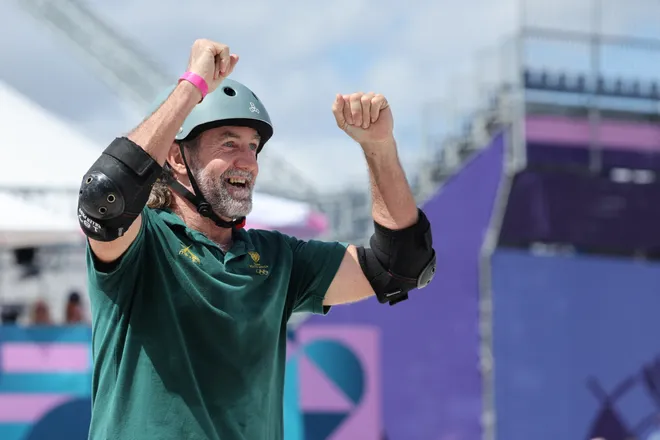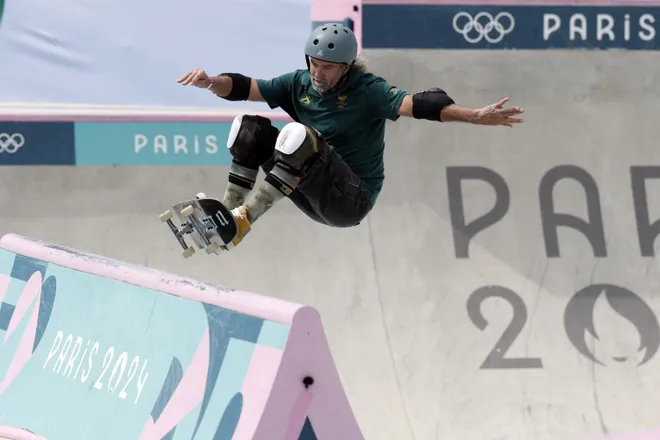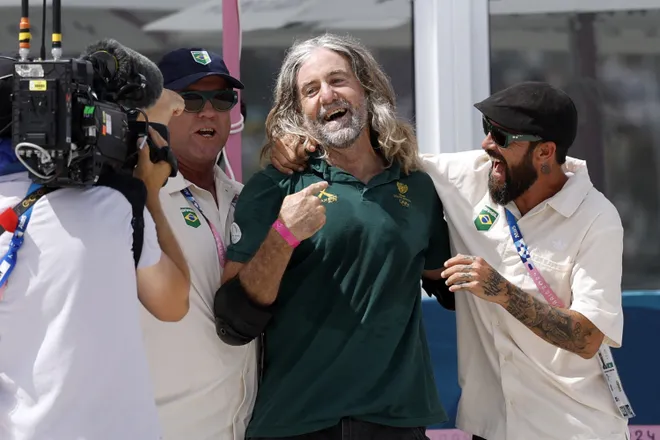49-year-old skateboarder Dallas Oberholzer makes mom proud at Paris Olympics
PARIS – Dallas Oberholzer came to Paris knowing he would finish last in the men’s park skateboarding competition. He’s 49 years old, for goodness sakes, competing in a sport ruled by Gen Z. He’s also from South Africa, a country where skateboarding has no infrastructure or funding. He’s spent decades traveling the world, funding this journey himself, often barely scraping by in search of the next good vibe.
Before the sport went corporate, before the Olympics, before Tony Hawk and Shaun White, that’s what skateboarding was really all about.
But being here hasn’t been all bad. Even as he approaches his 50th birthday he’s still growing, still learning. He even went to visit an osteopath in the Olympic Village the other day because, well, the knees don’t feel so good these days coming off the board.
“It was incredible,” he said. “As skaters, we used to get hurt and then go under the bridge and smoke weed. That’s how we used to recover. It’s become a science, and it’s only due to this format of skateboarding that I’ve been able to carry on and actually improve my performance. It’s crazy. I mean, how do you get your personal best at 49?”
Get Olympics updates in your texts! Join USA TODAY Sports' WhatsApp Channel
2024 Olympic medals: Who is leading the medal count? Follow along as we track the medals for every sport.
Oberholzer’s top score of 33.83 in qualifying won’t stand out in the history books, but his fist-pumping reaction when he got off the skateboard – and the standing ovation he received from the crowd – looked like he just won the gold medal.
Part of that was rooted in who was there watching: His mother.

It had been, Oberholzer said, 28 years since she watched him skate. It was just one of those typical things: Parents, especially when he was growing up, didn’t exactly envision their kids skateboarding as a job. And even then, it wasn’t much of one. Oberholzer traveled around the world, mentored young skaters, helped raise some money to build parks.
Even as a kid, she wanted him to play tennis. To him, it seemed like it would be more fun to be the tennis ball flying through the air.
“I started skating just because it was the best thing I could imagine,” he said. “It was the best feeling in my body, it was the best way to express myself and just blow up energy and put it into something that’s instant reward. You’re not waiting for your points or whatever place in the moment. Everything’s electrifying.”
Now, it’s a competition sport. It’s an Olympic sport. Skaters have entourages with coaches and physios. These days, It’s all about the scoreboard.
“God help us,” he said. “It’s becoming a bit too serious, and the youngsters might be doing it for ulterior reasons and pushed into it at a young age.”

But being in the Olympics keeps Oberholzer relevant in the sport. In his ideal world, somebody would see him on television and call him up and say they want to build a skate park and high-performance center in South Africa so that it could be accessible to more people and elevate the sport in his country the way it has grown in Brazil. In his country, skateboarding is more of a luxury than an activity that anyone can just go down and do at their local park.
“I’m not going to hang this thing up soon,” he said. “I hope there’s more Africans that can pick up skateboarding, but these kind of facilities are hard to come by. That’s why I need to travel to stay relevant in this terrain.”
Will Oberholzer make it to the next Olympics in Los Angeles? It’s a possibility. He thinks he can stay healthy and fit enough to compete. It’s a bit of a strange dynamic to be nearly 50 years old and hanging out with teenagers, but there’s something about this sport that connects generations.
“I don’t feel detached from them,” he said. “I’m surrounded by youth, and I’ve surrounded myself with youth development programs for so many years, not knowing really maybe why. But maybe it kept me young.”

And one thing never changed for Oberholzer: He still wants to impress his mother. Getting her to Paris was a big deal. Her advice was to do one big trick. He landed it early in the run, but by the end his legs gave out. He fell off the skateboard. He still had a lot to celebrate.
“She accepted that I’m a skateboarder and an Olympian at the same time,” Oberholzer said. “That’s my greatest accomplishment.”
The USA TODAY app gets you to the heart of the news — fast. Download for award-winning coverage, crosswords, audio storytelling, the eNewspaper and more.
Disclaimer: The copyright of this article belongs to the original author. Reposting this article is solely for the purpose of information dissemination and does not constitute any investment advice. If there is any infringement, please contact us immediately. We will make corrections or deletions as necessary. Thank you.







